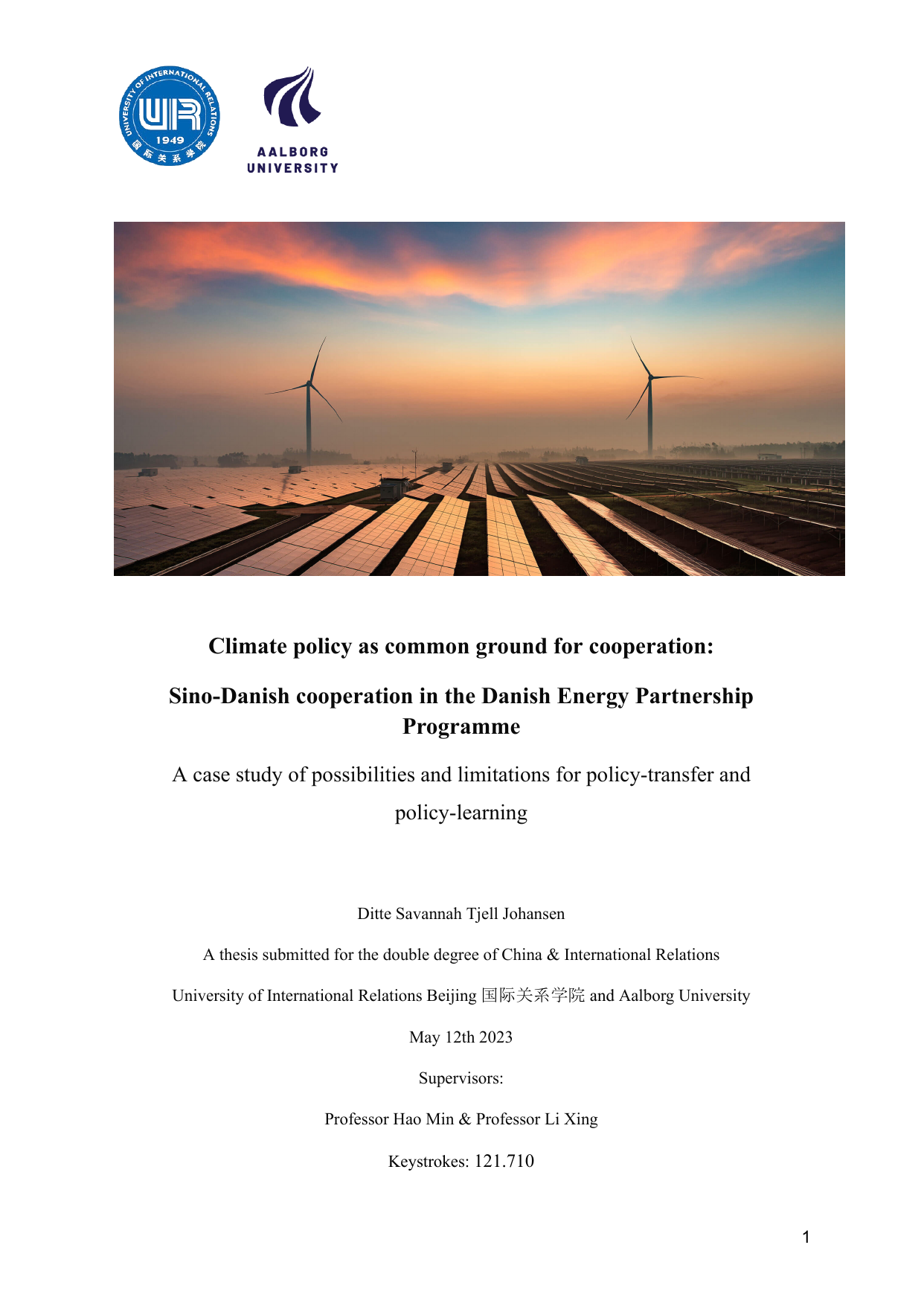
Climate policy as common ground for cooperation: Sino-Danish cooperation in the Danish Energy Partnership Programme A case study of possibilities and limitations for policy-transfer and policy-learning
Term
4. term
Education
Publication year
2023
Submitted on
2023-05-12
Pages
82
Abstract
The Intergovernmental Panel on Climate Change (IPCC) 2023 Sixth Assessment Report accentuates international cooperation to mitigate climate change. Meanwhile, geopolitics, the economic slowdown, and security issues challenge how international affairs are approached. This paper seeks to explore climate policy as common ground for cooperation despite profound challenges between the People’s Republic of China and the European Union. How climate policies and objectives are transferred between policy actors will be examined through a case study: Denmark’s bilateral energy cooperation with China in the Danish Energy Partnership Programme (DEPP). The analytical objective is to elucidate how policy-transfer and policy-learning feature in climate cooperation. Utilizing a qualitative dataset of an expert interview combined with Academy of Macroeconomic Research’s 2021 China Energy Transformation Outlook, this paper will explore the mechanisms in policy-learning and transfer. The analysis is followed by a discussion of the impact of external factors, covering the role of the European Union. Denmark’s partnership with China showcased the advantages of policy-learning and policy-transfer in favor of global climate cooperation. It was found that bilateral cooperation on policy formulation through policy-learning circumvents undesirable impact from external factors. Because the adverse effects of climate change cause global impacts, it was discovered that policy actors agree on depoliticizing climate policy to the greatest extent. This paper contributes to an underdeveloped field by providing a thorough analysis of how external factors affect bilateral collaboration.
The Intergovernmental Panel on Climate Change (IPCC) 2023 Sixth Assessment Report accentuates international cooperation to mitigate climate change. Meanwhile, geopolitics, the economic slowdown, and security issues challenge how international affairs are approached. This paper seeks to explore climate policy as common ground for cooperation despite profound challenges between the People’s Republic of China and the European Union. How climate policies and objectives are transferred between policy actors will be examined through a case study: Denmark’s bilateral energy cooperation with China in the Danish Energy Partnership Programme (DEPP). The analytical objective is to elucidate how policy-transfer and policy-learning feature in climate cooperation. Utilizing a qualitative dataset of an expert interview combined with Academy of Macroeconomic Research’s 2021 China Energy Transformation Outlook, this paper will explore the mechanisms in policy-learning and transfer. The analysis is followed by a discussion of the impact of external factors, covering the role of the European Union. Denmark’s partnership with China showcased the advantages of policy-learning and policy-transfer in favor of global climate cooperation. It was found that bilateral cooperation on policy formulation through policy-learning circumvents undesirable impact from external factors. Because the adverse effects of climate change cause global impacts, it was discovered that policy actors agree on depoliticizing climate policy to the greatest extent. This paper contributes to an underdeveloped field by providing a thorough analysis of how external factors affect bilateral collaboration.
Keywords
Documents
